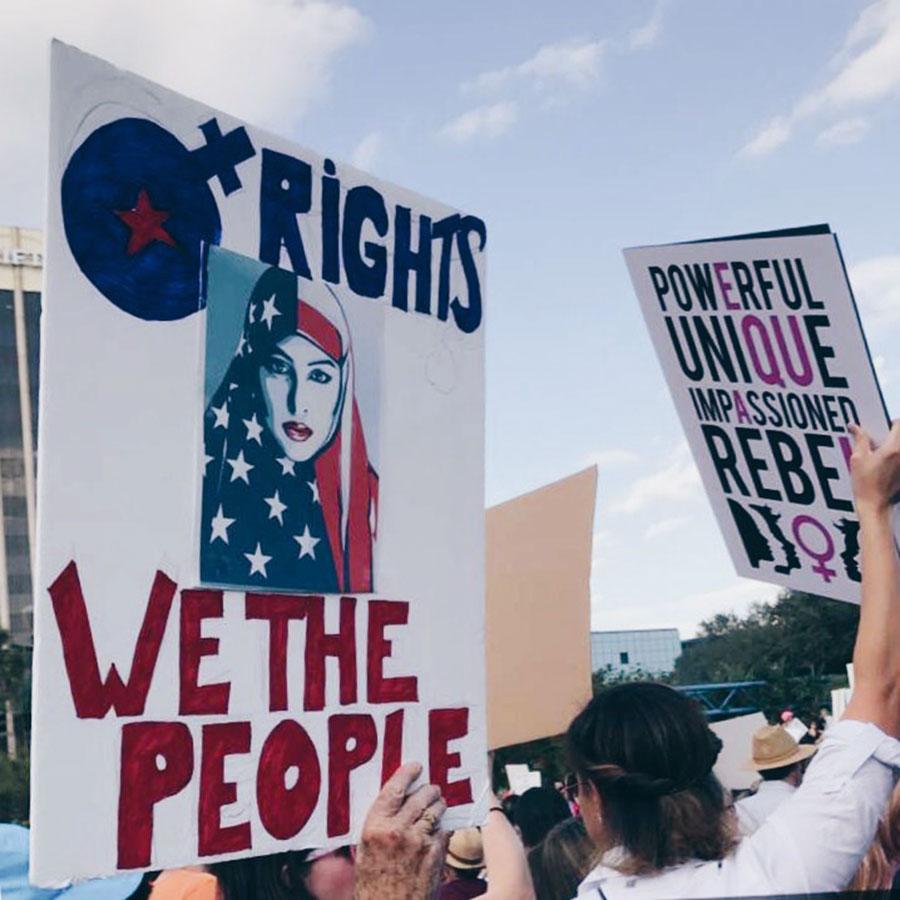MILLENNIALS TRUMP POLITICAL APATHY
Student are taking an active role in politics like the Women’s March in Orlando last month.
February 14, 2017
Everyone has their own opinion on the millennial generation: they’re lazy or self-involved, and in general not meeting up to the caliber of citizenship set to them by elder generations. Such arguments point to the trend of political apathy among youth, bolstered by evidence that millennials make up only 19 percent of the electorate. In other words, it’s a common misconception that politically, millennials just don’t care.
“In many aspects [millennials] are not as involved as they should be,” said Mrs. Maria Lyons, who has been voting since Nixon’s election. “There are too many other things that are important to them, like self-involvement.”
However, recent times have brought forth some of the most potent activism seen in recent years, such as the response to the election of Donald Trump. These included powerful Twitter movements such as #BlackLivesMatter, and grassroots organizing that turned out huge numbers for the Women’s Marches across America. Millennials participated in and powered many of these events. Because while millennials abstain from voting, they show up in overwhelming numbers when it’s time to volunteer. And in the wake of such a controversial election, now will be the time that millennials break their habits of political apathy.
On both sides of the aisle, it can be agreed that most millennials prefer to take a grassroots approach to enacting change. Rather than lobbying against the bigger authorities at the national levels, many rally at the local level or on social media, a phenomenon clearly exhibited by the popularity of Bernie Sanders’ 2016 presidential campaign. Much of this can be attributed a lack of governmental trust among millennials; only 73 percent claim to trust the federal government. Whether this is because of the government’s increasingly oligarchic tendencies or the fact that millennials are experiencing more financial difficulties than some previous generations, it is clear that millennials and their leaders have trouble connecting.
“People don’t listen to the big sources anymore. They want to go back down to their local communities and roots and figure things out for themselves,” said sophomore Elyse Larson. “I think people might not feel very significant in voting, but they think that if they can get together at the local level, they can make a greater difference in the higher levels of politics.”
When it comes to volunteering and being involved in social movements, millennials break the records of previous generations, with 70 percent reporting to have volunteered for a cause they cared about. Although it is easy to chalk up this trend to school volunteering requirements, the passion with which millennials pursue social movements underscores their great levels of civic duty. They have been especially involved in the LGBT movements and #BlackLivesMatter movements, which 60 percent of Americans under 30 support, compared to only 37 percent of those ages 50-64. For junior Kennedy Richardson, a concern with women’s and civil rights convinced her to join the Women’s March on Jan 10.
“I choose to get involved because I think that gender quality has been an issue for a long time,” said Richardson. “These issues have actually gotten me more involved in politics so that I can stay informed, because honestly? Knowledge is power.”
It’s possible that due to the recent election season, during which political propaganda flooded social media, millennials are paying more attention than usual. But this is not your average once-in-four years spike in political attention. This time, the president is someone who poses a real danger to millennials, threatening to turn back the clock on issues they care about, like immigration, LGBT, and civil rights, among others.
Looking at the streets of Orlando, along Lake Eola or in the terminals of Orlando International Airport (MCO), it is unsurprising how many of the faces of protesters are young. Millennials are the generation who have found the balance between hashtags, the language of activism, and on-the-ground organized action. Now, it is up to them to harness the post-election energy to take a stand for what is ultimately their future.



















